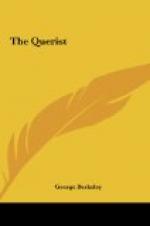13. Qu. Whether the whole city of Amsterdam would not have been troubled to have brought together twenty thousand pounds in one room?
14. Qu. Whether it be not absolutely necessary that there must be a bank and must be a trust? And, if so, whether it be not the most safe and prudent course to have a national bank and trust the legislature?
15. Qu. Whether objections against trust in general avail, when it is allowed there must be a trust, and the only question is where to place this trust, whether in the legislature or in private hands?
16. Qu. Whether it can be expected that private persons should have more regard to the public than the public itself?
17. Qu. Whether, if there be hazards from mismanagement, those may not be provided against in the framing of a pubic bank; but whether any provision can be made against the mismanagement of private banks that are under no check, control, or inspection?
18. Qu. Whatever may be said for the sake of objecting, yet, whether it be not false in fact, that men would prefer a private security to a public security?
19. Qu. Whether a national bank ought to be considered as a new experiment; and whether it be not a motive to try this scheme that it hath been already tried with success in other countries?
20. Qu. If power followeth money, whether this can be anywhere more properly and securely placed, than in the same hands wherein the supreme power is already placed?
21. Qu. Whether there be more danger of abuse in a private than in a public management?
22. Qu. Whether the proper usual remedy for abuses of private banks be not to bring them before Parliament, and subject them to the inspection of a committee; and whether it be not more prudent to prevent than to redress an evil?
23. Qu. Supposing there had been hitherto no such thing as a bank, and the question were now first proposed, whether it would be safer to circulate unlimited bills in a private credit, or bills to a limited value on the public credit of the community, what would men think?
24. Qu. Whether experience and example be not the plainest proof; and whether any instance can be assigned where a national bank hath not been attended with great advantage to the public?
25. Qu. Whether the evils apprehended from a national bank are not much more to be apprehended from private banks; but whether men by custom are not familiarized and reconciled to common dangers, which are therefore thought less than they really are?
26. Qu. Whether it would not be very hard to suppose all sense, honesty, and public spirit were in the keeping of only a few private men, and the public was not fit to be trusted?
27. Qu. Whether it be not ridiculous to suppose a legislature should be afraid to trust itself?
28. Qu. But, whether a private interest be not generally supported and pursued with more zeal than a public?




